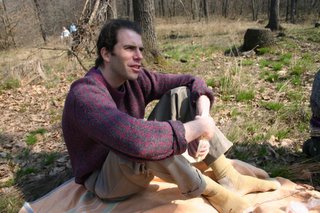Arrival in New York (written two weeks ago)
Subject:
Arrival in New York City
Text:
I'm sitting in the small living room of my host, Dr. Anton Bara, an MD originially from the Phillipines. Looking out at midtown Manhattan here on E. 86th & 1st ave. The building dates back to at least the fifties. The metal laundry hamper fixed tothe wall in the bathroom is just like the one in the bathroom back in the Bronx where my father and i lived in the early 1980s. The apartment still has all its original fixtures, as far as i can see. By the looks of the flaking ceiling and walls, it hasn't seen too many paint jobs, either. A lovely collection of antiques furnishes the place, including a pair of old kilims onthe floor and several antique paintings on the walls.
New York is so very different from most European cities. The people are largely quite friendly. But i can't say that about the city itself. Its diverse character prevents from having a sufficiently strong core that would enable this, such as I've seen in Stockholm. At the big airport in Stockholm there are clearly marked signs guiding you to the train that takes you swiftly and comfortably into the center of town. At JFK in the NY, it's chaotic. The train was hard to find and there were no instructions whatsoever about how to pay or even where it goes. As it turned out, i had to take it to a bus stop, then take a lingish bus journey to an elevated subway train that took me to Manhattan where i had then to change to yet another train. The whole journey cost $4 and took well over an hour. I had to ask directions several times. By contrast, the Stockholm train takes 20 min, by costs at least $25.
New York certainly has a buzz to it. But it's not essentially different from Budapest. The apartments cost much more, but they aren't really any nicer. And the jobs people do are more or less the same, except they are more influential to the world economy. A Budapest adman works on national and regional campaigns, where his NY counterpart works on global ones. But to both, it's just "my job," after which they meet friends, eat, sleep, etc. Newcomers may feel thrilled to be on top of the world economy, but that wears off and it becomes just another place.

